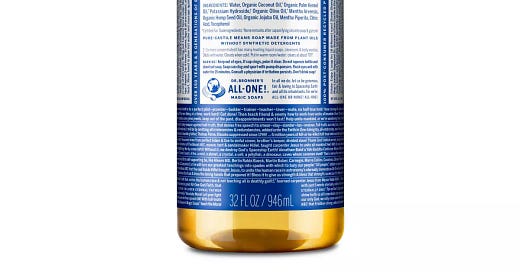The Heartbreaking, Inspiring Story Behind That Wordy Health-Food-Store Soap
Dr. Bronner's came from a singular, troubled soul, according to a documentary about his life, and 75 years later his company remains dedicated to mental health causes, including psychedelic therapy.
If you’ve ever been in a shower with a bottle of Dr. Bronner’s Magic Soap, you’ve noticed its distinctive label crammed with thousands of words about how to live a good life: “When we teach the Moral ABC all mankind is united brave-strong-just-free! For the future will be better when we are better; times will change when we change; conditions will improve when we improve if you & I cooperate by full truth to accomplish them!” “You & I, Here & Now, Today! Not them nor they! You & I Today!”
And while noticing this, you’ve also probably thought: Who is this guy?
While other products strive for authenticity as they try to communicate “shared values” and “brand voice” with their customers, Dr. Bronner’s just does it, has been doing it for decades. The label, touting Bronner’s “Moral ABC” that aims “TO UNITE ALL MANKIND FREE!” leaves little doubt that there’s a singular voice, a singular mind, behind its brilliant gambit: If you want to change the world, why not start by giving folks some light reading to do while they suds up their hair?
Remarkably, 75 years after its founding, the company is more vibrant than ever, sticking mostly with Bronner’s original formulas and maintaining Bronner’s core principles as a socially responsible company. Though Bronner died 25 years ago, his grandsons, David and Mike, now run the company and took in $170.3 million in revenue last year, selling the product in major retailers in 40 different countries. They’re not only socially responsible but also cutting edge: Last year they began providing psychedelic therapy to their employees as a healthcare benefit, and have also donated millions of dollars to fund study and advocacy of psychedelic-assisted therapy for depression, PTSD, addiction, and end-of-life anxiety. This follows previous support of drug policy reform, including legalization of cannabis.
Turns out there’s a reason for their abiding interest in mental health causes, and it’s all part of Bronner’s origin story. Intrigued by my own shower reading—and what I learned about the company’s advocacy interests—I recently watched a delightful 2006 documentary about him called Dr. Bronner’s Magic Soapbox. It delves into Bronner’s complicated personality and family history in what appears to be an honest way while still ultimately painting an inspiring picture.
Bronner, we learn, was not a doctor, but he was a master soapmaker, which is apparent in the enduring product. He was also a self-proclaimed rabbi, as well as a self-proclaimed relative of Albert Einstein.
But the heart of the film is Bronner’s son, Ralph, 68 at the time of filming. (He died in 2015.) The crew follows him across the country, on a mission to tell people about his father’s work, philosophy, and legacy. He gives talks seemingly wherever someone will let him, and often chats up strangers in hopes of telling them a bit about his dad and offering them some free soap. This dedication reads as all the more arresting when you learn that the senior Bronner was a largely absentee father, which meant that Ralph lived in 15 orphanages and foster homes growing up. He could be forgiven if he were resentful of his father or the company.
But Ralph also has good reasons for looking back on his dad’s life with empathy. Emanuel grew up Jewish soapmaking family in Germany, leaving for the United States in 1929. He was, understandably, deeply disturbed as he watched Germany succumb to Hitler in the lead-up to World War II and the Holocaust. In 1944, Paula, Emanuel’s wife and the mother of Ralph and his two siblings, experienced an emotional breakdown and died in an Illinois mental hospital. Emanuel began giving impassioned, unscheduled public speeches about his views on mankind, and one talk in particular, at the University of Chicago, got him committed to Elgin State Asylum.
He developed “Dr. Bronner’s Magic Soap” shortly after escaping from Elgin in 1947. The all-purpose liquid, originally infused with peppermint, became a favorite of health food store denizens because of its natural ingredients and its environmental consciousness; instead of trying to sell consumers an endless array of products, Dr. Bronner’s suggests you use it as a shampoo, a body soap, a toothpaste, or a household cleaning product, and encourages customers to DILUTE! DILUTE! OK!
At this family-heavy time of the year, I have a particular appreciation for this family story. A troubled, imperfect man had some very good ideas about soap, and some pretty good ideas about how people can be good. He probably suffered from mental illness, and definitely had a gene for determined and emphatic expression of his own ideas, a gene he passed down to his son. He lacked parenting abilities, but his son and grandchildren forgave him that, carrying on the best parts of his legacy and improving on his business so that it can survive into the future, not just with an eye for profits but also with care for their employees that Emanuel would likely be proud of.





I KNEW there had to be a story behind this bottle.You unraveled it all-again. Going to check out the doc! Thank you Jennifer!
Fascinating background to a favorite soap - thank you!